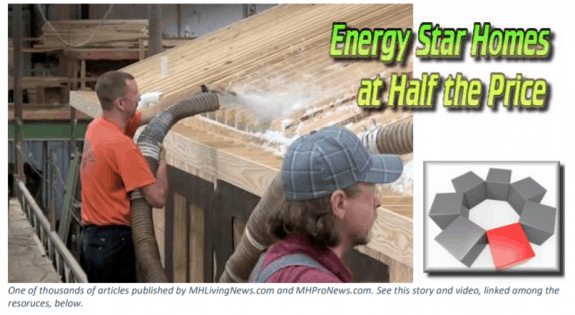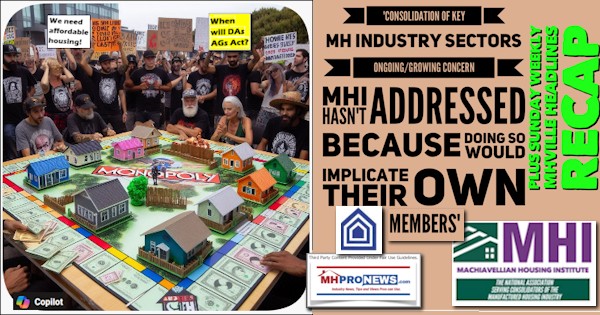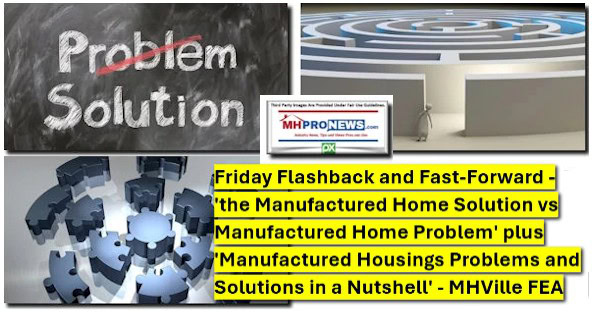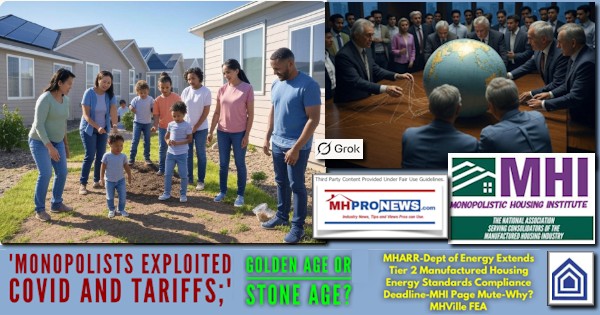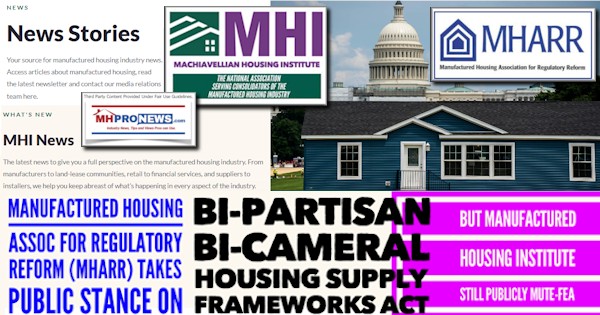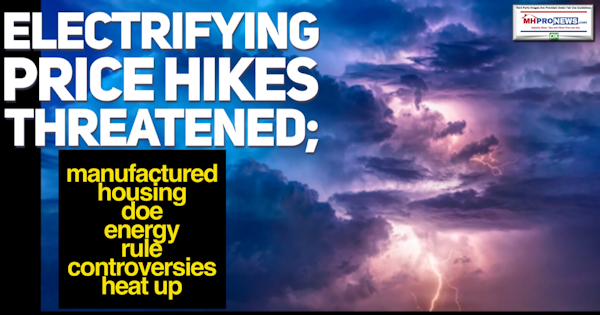
There could be several different reports on this Department of Energy (DOE) manufactured housing energy rule. As of yesterday evening, over 1,000 comments had already been posted publicly on the federal regulatory comments site. That indicates several things – including, but not limited to – the array of voices that are pressuring the DOE to act in ways that could dramatically impact manufactured housing affordability.
Translated, prices could spike if this goes into effect. That in turn would logically hurt the lowest cost home buyers most of all.
Among the haystack of comments are those from the Manufactured Housing Association for Regulatory Reform (MHARR), which opposes the measure, and has for years. Their comments letter is linked as a download further below. It is introduced by pull-quotes from an introductory release to the Daily Business News on MHProNews. Or, readers can click the below, and read their full introductory commentary as well as the complete comments letter from the MHARR website.
MHARR to DOE: Only Three Choices for MH Energy Rule – Abandon, Complete Start-Over, Or Face Legal Action | Manufactured Housing Association Regulatory Reform
Contact: MHARR (202) 783-4087 Washington, D.C., September 17, 2018 – The Manufactured Housing Association for Regulatory Reform (MHARR) filed written comments ( see, copy attached hereto) on September 17, 2018 responding to an August 3, 2018 Notice of Data Availability and Request for Information (NODA) published by the U.S.
“Only Three Choices…”
“…In its comments, MHARR commends DOE for re-examining and re-evaluating the substance, framework and approach of its earlier June 2016 proposed rule for manufactured housing energy standards, but points out that the “negotiated rulemaking” proceeding which led to the 2016 proposed rule – which was rejectedby the Office of Management and Budget’s Office of Information and Regulatory Affairs (OIRA) – and still forms at least part of the underpinning for the 2018 NODA, was so fundamentally tainted and fatally defective, that no legitimate rule and no legitimate standard can ever be salvaged from that process,” said the MHARR introductory statement.
Accordingly, MHARR’s comments tell DOE that it effectively has only three choices in this matter:
(1) abandon the subject of manufactured housing energy regulation altogether;
(2) re-start the manufactured housing energy standards rulemaking process completely and in full cooperation with HUD, so as to eliminate any lingering taint, bias, or prejudice from the illegitimate and arguably scandalous “negotiated rulemaking” process, as well as the impacts and effects of underlying policies that have since beenrejected by the Trump Administration, including the so-called “Paris Climate Accord” and the Obama Administration’s dubious “Social Cost of Carbon” construct; or
(3) face potential legal action if it proceeds with any energy standards arising out of, or derived from the illegitimate and discredited DOE “negotiated rulemaking” process.
MHARR obliquely slammed the Manufactured Housing Institute (MHI), using the following phrasing.
“Indeed, DOE’s sham “negotiated rulemaking” process – contrived by DOE behind closed doors with energy special interests and some within the industry itself (as shown by documents disclosed pursuant to MHARR Freedom of Information Act requests) after MHARR had successfully resisted prior DOE rulemaking activity – should never have gone forward in the first place and cannot now be somehow legitimized, after the fact, by DOE’s “alternative” proposals, which themselves continue to be based on data, information and presumptions developed during the course of that “negotiated rulemaking” process.”
MHProNews has previously documented the flip-flop that MHI engaged in, when after months or pressure from MHARR, the SBA, a university study, and MHProNews – among others – the Berkshire Hathaway tilted trade group in Arlington, VA finally relented. See that linked report with associated documentation, linked below.
Manufactured Housing Institute (MHI) Shifts on DOE Regulatory Rule, Report, Analysis
As MHARR, MHProNews, the National Association of Home Builders (NAHB), and others have noted for years, the costs associated with the rule would ‘price out’ hundreds of thousands of potential buyers of HUD Code manufactured homes.
The Sierra Club and others are putting pressure on the DOE to put heavier energy standards on HUD Code manufactured homes as a requirement. That would cause serious spikes in pricing. It could thus could stall all new HUD Code manufactured home sales, particularly for ‘entry level’ priced product.
So, this could shape up to be a serious battle in Washington that would impact retailers, communities, producers, lenders, suppliers and others in the industry, if the measures were to be implanted. To learn more, click the MHARR regulatory comments letter, linked here, or see the full MHARR introductory release and their comments letter, at the link to MHARR further above. “We Provide, You Decide.” © ## (News, analysis, and commentary.)
(Third party images and content are provided under fair use guidelines.)
1) To sign up in seconds for our MH Industry leading emailed news updates, click here.

2) To pro-vide a News Tips and/or Commentary, click the link to the left. Please note if comments are on-or-off the record, thank you.
3) Marketing, Web, Video, Consulting, Recruiting and Training Re-sources


